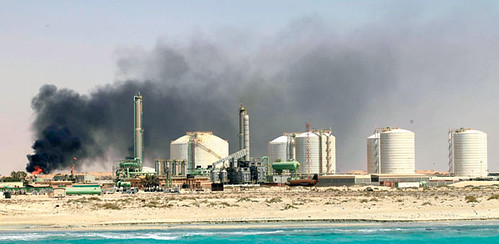
Zueitina oil terminal located near Benghazi, Libya has been the scene of labor unrest. The industry in Libya is no facing a downturn in production after the imperialist overthrow of Gaddafi., a photo by Pan-African News Wire File Photos on Flickr.
Strikes prevent Libya from issuing September oil export plans
12:03pm EDT
By Julia Payne and Feras Bosalum
LONDON/TRIPOLI (Reuters) - OPEC oil producer Libya told its customers on Tuesday it could make no promises on crude deliveries next month as on-off strikes paralyzed its major sea terminals.
The North African country's exports provided nearly 1.5 percent of global supplies until June, but output has since plunged, putting upward pressure on international oil prices.
Libya's state National Oil Corp (NOC) said in a statement it could provide no September loading schedules, normally sent to contract buyers of its gasoline-rich crude by this time of the month.
The NOC chairman, Nuri Berruien, told Reuters the September schedules "will be modified, not canceled...because of the current sit-ins at ports and fields."
Labor unrest gripping Libya's oilfields and ports has cut output to the lowest since the 2011 war that overthrew Muammar Gaddafi, and some analysts say it is well below 500,000 barrels per day (bpd), compared with 1.3 million bpd in June.
Some estimates put exports as low as 300,000 bpd, depriving the 90 million bpd world market of approaching 1 million bpd - largely consisting of highly-prized light sweet crude.
Striking security guards on Monday again shut the country's two biggest crude export terminals, Ras Lanuf and Es Sider, just hours after they had reopened from a two-week stoppage.
Late on Monday the deputy oil minister said exports from Es Sider could resume on Thursday, once some output from associated oilfields restarted and a new schedule was made, but the NOC statement admitted firm undertakings for September were not yet possible.
"Due to continuation of strikes in some Libyan terminals (Ras Lanuf, Es Sider, Zueitina, Marsa Al-Hariga) ... we are not able to allocate any quantity of crude oil exports from those terminals during September 2013," the NOC statement said.
The drop in availability of Libyan crude oil was a major factor, along with prospects for disruption of Iraqi exports, in driving global benchmark Brent crude oil futures up towards $110 per barrel on Tuesday.
As a result, European refiners are set to cut crude oil processing rates by around 500,000 barrels per day (bpd) as high oil prices hit their already weak profits.
The outages are already undermining prospects of foreign investment in the oil sector, and the postponement of loading schedules could hurt confidence in the country as a supplier, which risks forcing it to discount prices in future.
The fast-evolving strikes by workers and occupations of facilities by jobless people seeking employment has made accurate readings for Libya's output and exports difficult.
One industry source with close ties to Libya estimated production on Monday at around 545,000 bpd, well below total capacity of around 1.6 million bpd. Other analysts put it lower.
"We think Libyan production is down around 0.4 million bpd," Richard Mallinson, chief policy analyst at London-based consultancy Energy Aspects said.
"Exports would be even lower at around 0.3 million bpd."
DEAL TO END ES SIDER STRIKE
Deputy oil minister Omar Shakmak, who himself estimated current oil production at 700,000 bpd, said workers and local authorities had reached an agreement to end the Es Sider strike.
"They decided to resume operations, (Es Sider) can be considered open," Shakmak said, adding that he expected the first cargo to be loaded around August 15-16.
"There is still no resumption at Ras Lanuf, but if Es Sider restarts maybe Ras Lanuf will follow," he said.
The two ports have a capacity of around 600,000 barrels per day, just under half the country's export capacity.
The port of Marsa Al Hariga was expected to remain closed for crude oil exports for the rest of the week but limited domestic movements were taking place, Shakmak said.
"A cargo of fuel oil was loaded yesterday for internal shipment," he said. "The terminal is open only internally, I do not see crude shipments for this week."
He said that there was "still no progress" at the Port of Zueitina, closed since around mid-July due to strikes.
The Arabian Gulf Oil Company (AGOCO) has reduced production to around 60,000 bpd mainly because of the port closures, he said.
The ports of Zawiya, Marsa Al Brega and Mellitah were operational, he added.
(Editing by Joseph Radford and Anthony Barker)
No comments:
Post a Comment